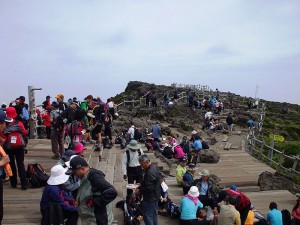Twenty-five years ago, when Koreans were known for having the world’s longest work week (nominally six days, often longer), they still found time to get outdoors. Hiking clubs were a big deal. Camping was less popular because it requires a couple days of leisure in a row, but it was still popular.
Over the decades, that’s been changing. Koreans are working less (a luxurious five-day week is commonplace) and last year their kids saw their school week cut from six to five days. With all this free time, Koreans are embracing camping in all its forms, including classic tent camping (tents sales are at an all-time high) and glamping. (Hotels on popular Jeju Island offer packages that run over $400 a night, not including taxes and service charges).
And they’re not just fair-weather campers, according to Hong Mee-hee, PR manager at Coleman Korea: “Even in terms of camping activity, Korean campers have a unique culture such as four season camping which is not common in other countries.”
Camping is also the focus of multiple television programs and featured as a backdrop on others.
Contrast that to the U.S. Try to name just one camping program on any of the glabillion cable channels that ooze into your living room every night. Then try to count the number of networks devoted to spectator sports. Our theory: the U.S. has too many spectacular parks. Too many preserves and protected wilderness areas. If you live in Seoul or Pusan or any other large city in Korea, you appreciate the outdoors. Americans take everything for granted.
Photo: Hikers at the top of Mount Halla, Jeju Island, South Korea, by “Mass Ave 975” via Wikimedia Commons.










